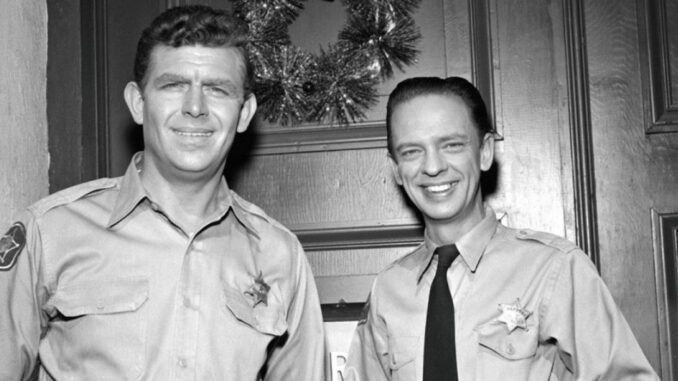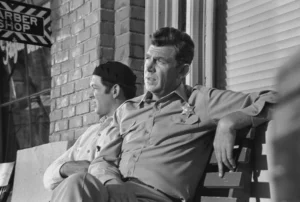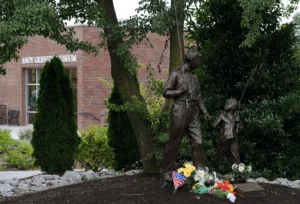
The Fascination With Mayberry and Andy Griffith’s Hometown
What Made Mayberry Special?
Mayberry represents a simple, peaceful, small-town America that many people longed for during the 1960s—and still do today. It’s a place where neighbors know each other, life moves at a slower pace, and kindness seems to be woven into everyday life. But is that what Griffith’s real hometown was like?
Mayberry vs. Mount Airy: A Tale of Two Towns
Many fans assume Mayberry was based on Mount Airy, North Carolina, Andy Griffith’s actual hometown. The similarities between the two towns are striking, but there are also significant differences that Griffith didn’t want to address.
Why Andy Griffith Resisted the Hometown Question
He Wanted Mayberry to Be a Universal Experience

One of the main reasons Griffith disliked the hometown question was because he wanted Mayberry to feel universal, not tied to one specific place. He believed that Mayberry represented an ideal version of small-town life that could exist anywhere, not just in North Carolina. By focusing on universal values—like friendship, family, and community—Griffith felt the show could resonate with people from all backgrounds.
He Didn’t Want Mayberry Reduced to a Simple Comparison
Mayberry was Griffith’s vision of a perfect town, shaped by nostalgia and imagination. He feared that constantly comparing it to Mount Airy would diminish the show’s creative elements, reducing Mayberry to a simple imitation rather than a unique creation.
How Mount Airy Embraced the Mayberry Connection
Mount Airy Becomes a Tourist Attraction
Ironically, while Griffith shied away from linking Mayberry to Mount Airy, his hometown leaned into the connection. Today, Mount Airy is known as the “Real Mayberry,” with numerous attractions, businesses, and festivals celebrating The Andy Griffith Show.
Annual Mayberry Days Festival
Each year, thousands of fans flock to Mount Airy for “Mayberry Days,” a festival celebrating the show and its characters. Visitors can tour replica spots, attend events inspired by the show, and meet actors and fans alike who embrace the Mayberry spirit.
Did Mayberry Reflect Griffith’s True Memories?
How Childhood Influences Shaped Mayberry

Though he avoided confirming it, Griffith’s childhood memories of Mount Airy undoubtedly influenced aspects of Mayberry. Many of the show’s characters, like Otis the town drunk or Floyd the barber, were inspired by people he knew growing up. But Griffith wanted the show to reflect an idyllic, almost dreamlike version of a small town—not necessarily a realistic portrayal of his own experiences.
The Power of Nostalgia in Creating Mayberry
Nostalgia played a significant role in how Griffith shaped Mayberry. Like many people, he idealized aspects of his past, creating a warm, wholesome world that reflected his best memories rather than any specific place.
The Contrast Between Realism and Fantasy in the Show
Mayberry: A Carefully Crafted Ideal
Griffith meticulously crafted Mayberry to be an idealized setting. The show avoided complex issues and conflicts, presenting a simplified, often humorous take on life’s everyday struggles. By doing so, Griffith allowed audiences to escape reality, if only for a moment, rather than be confronted with reminders of their real lives.
A Universal Appeal That Transcends Location
Part of what makes The Andy Griffith Show timeless is its ability to resonate with people regardless of their background. Mayberry represents the small-town charm that people across the country can appreciate, even if they’ve never been to North Carolina.
Andy Griffith’s Mixed Feelings About Fame and Mayberry’s Legacy
Why Fame Complicated His Relationship With Mayberry
As the show grew in popularity, fans increasingly wanted to know about Griffith’s hometown, pressuring him to reveal whether Mayberry was “real.” For Griffith, who was a private person, these questions sometimes felt invasive and detracted from the fictional magic of Mayberry.
The Challenge of Separating Character From Actor
Many people assumed that Griffith, like his character Sheriff Andy Taylor, was a simple, small-town man. But in reality, Griffith was a complex person with a diverse career. The constant association with Mayberry sometimes made it hard for him to move beyond the “small-town sheriff” persona.
How Griffith’s Reluctance Shaped the Show’s Legacy
Mayberry’s Legacy Lives On Without a Single Location
Griffith’s reluctance to tie Mayberry to any specific town may have ultimately helped the show’s legacy. Today, fans from all over the world can identify with Mayberry, seeing parts of their own lives and experiences in the town’s characters and stories.
A Masterpiece of Small-Town Americana
By refusing to pinpoint Mayberry’s “real” inspiration, Griffith preserved its status as a masterpiece of Americana, a town that lives on in the hearts of viewers everywhere. This approach allowed fans to project their own memories and experiences onto Mayberry, making it timeless and deeply personal.
The Appeal of Escapism in The Andy Griffith Show
Creating a World Free of Complexity
In an era marked by social and political turmoil, The Andy Griffith Show provided viewers with an escape to a simpler time. For many, Mayberry was more than just a fictional town—it was a comforting retreat.
Why Fans Still Cling to the Mayberry Mythology
To this day, fans hold on to the idealized version of Mayberry because it represents values and experiences they wish were still prevalent. It’s a place where kindness prevails, troubles are small, and community bonds are unbreakable.
Conclusion: Griffith’s Legacy and Mayberry’s Eternal Charm
Andy Griffith’s reluctance to confirm Mayberry as his hometown’s replica only added to its mystique, allowing Mayberry to transcend geography and embody universal values. While his fans may have been disappointed by his evasion, his vision preserved Mayberry as a symbol of nostalgia and simplicity. By keeping Mayberry’s origins vague, Griffith created a town that everyone could visit, no matter where they’re from.
Mayberry continues to charm audiences, not because it reflects any one place, but because it represents the best of many places. Griffith’s legacy lies not just in the show but in the timeless, universal appeal of a small town where life was, if only for 30 minutes each week, perfect.
